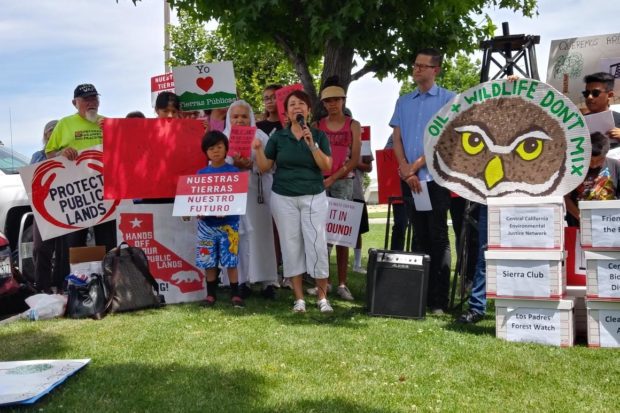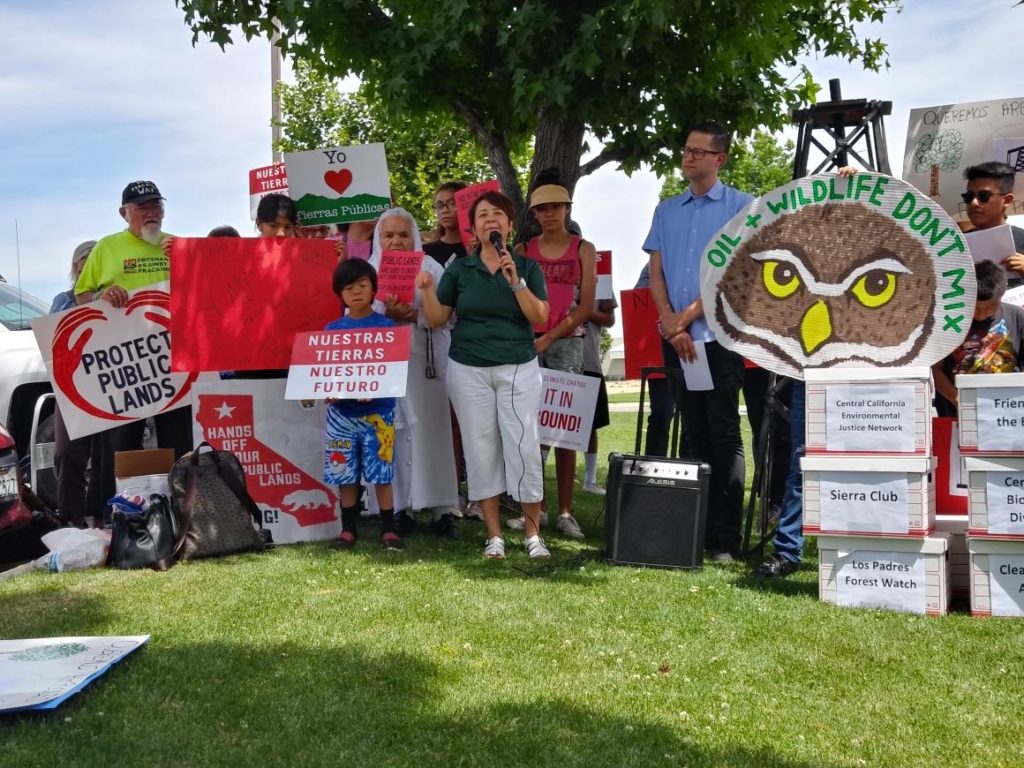

By Cesar Aguirre and Nayamin Martinez
A major victory occurred on Aug. 1 when a federal judge accepted an agreement between environmental justice organizations, conservation groups and the U.S. Bureau of Land Management (BLM) that will suspend new oil and gas leases across more than one million acres of public lands in California’s Central Valley and Central Coast.
But that is not all. Another agreement requires the BLM to conduct new environmental analysis before drilling is allowed on 4,000 acres that were leased in Kern County in December 2020.
These agreements require federal officials to disclose the harm that fracking does to the air, water and communities, something that the BLM has done poorly in the past.
Another part of its work that the BLM has not done properly is to evaluate the significant harms of oil extraction and fracking to communities and the environment before authorizing new leases. On the contrary, the BLM has approved leases for new oil wells, the most recent ones in December 2020 in Kern, without properly analyzing and documenting the impacts to air and water quality and public health.
Although all types of oil drilling pose unacceptable risks to public health, safety and the climate crises, fracking is more dangerous. A 2015 report from the California Council on Science and Technology concluded that fracking in California happens at unusually shallow depths, dangerously close to underground drinking water supplies, with unusually high concentrations of chemicals, including substances dangerous to human health and the environment.
And, according to BLM estimates, up to 90% of new wells on federal lands are fracked. New drilling in general, but in particular fracking, would have intensified air and water pollution in the Central Valley, which already has some of the most polluted air in the nation and faces water scarcity and drought.
In 2019, the BLM, under the Trump administration, announced the end to a moratorium of new onshore oil and gas leases on California public lands, which began in 2012, when climate and community groups successfully sued the BLM and the moratorium was established.
Communities in the Central Valley and the Central Coast that were threatened by the end of the moratorium mobilized in strong opposition to the new leases for drilling and fracking. In jeopardy were not only areas that have been already heavily affected by oil extraction—Kern, Fresno, Kings, Ventura, San Luis Obispo and Santa Barbara counties—but also places that have not experienced it before, including Tulare and Madera counties.
Despite BLM efforts to limit public participation by holding only one public meeting for the entire region and not offering interpretation for non-English speakers, buses with hundreds of concerned residents from Madera, Fresno and Tulare counties traveled at the end of May 2019 to Bakersfield and waited for hours to give public comments.
Furthermore, 85 community and advocacy groups submitted written comments and on June 10, the last day to submit public comments, environmental and community groups again traveled to Bakersfield to deliver more than 90,000 public comments opposing the new leases.
When all these efforts failed and the BLM announced that more than one million acres would be open to leases, a diverse group of organizations that included environmental justice groups (e.g., the Central California Environmental Justice Network), conservation groups (e.g., The Wilderness Society, the Sierra Club, Friends of the Earth, Earthjustice, the Natural Resources Defense Council), business groups (e.g., Patagonia) and even the State of California filed lawsuits challenging this decision based on the failure of the BLM to conduct a full environmental assessment.
The agreement that was finally reached between the BLM and the plaintiffs gives some hope that at least for now our public lands will remain protected from the greediness of the oil industry. It is already torturing to the eyes, our health and the environment to see the thousands of oil rigs that are scattered throughout Kern County and some parts of Kings and Fresno counties. We do not need more of that harm in our iconic national parks, such as Sequoia and Kings Canyon, that were included in the proposed leases that the BLM was willing to authorize.
Fossil fuel extraction has wreaked havoc on numerous neighborhoods in Kern County for far too long, putting people’s lives at risk. We do not want that risk to be exported to threaten the wildlife and ecosystems of our public lands and to exacerbate our climate crisis.
In the words of Daniel Rossman, the California deputy director with The Wilderness Society, “this agreement represents an important step towards ensuring our public lands are managed to prioritize people, clean air, clean water and climate over fossil fuel industry profits.”
This win feels good. It shows that the activism of diverse stakeholders can really make a difference in protecting our backyards from the oil industry.
But there is much more work to be done. Our elected officials remain cozy with Chevron, Aera and many other oil companies. We still need to continue pushing Governor Newsom to stop oil permits; the ban on fracking he announced last year is not enough, as fracking is just one of several oil extraction methods.
At the national level, we need to ensure that President Biden fulfills his campaign promise of locking new oil extraction to reduce greenhouse gas emissions.
But the road ahead will not be easy. As the climate crisis continues and gas prices remain high, who are our politicians going to hear? Us or the oil and gas industry that cries that it is severely affected by the war in Ukraine and tighter environmental regulations.
All while they continue to rake in record profits (in 2021, Shell, Chevron and BP made more than $75.5 billion in profits according to the watchdog organization Accountable.US) as communities pay the price at the gas pump and in the form of increased pollution and climate change effects including but not limited to wildfires, heat waves and drought. But don’t get discouraged: Enjoy this victory and recharge for the many battles ahead.
*****
Cesar Aguirre is a community organizer for the Central California Environmental Justice Network (CCEJN) in Bakersfield.
Nayamin Martinez is the executive director of the CCEJN.
[insert Oil & Gas Leasing.jpg]Community members from Fresno and Kern counties delivered more than 90,000 comments to the Bureau of Land Management offices in Bakersfield in June 2019. Photo by Cesar Aguirre
